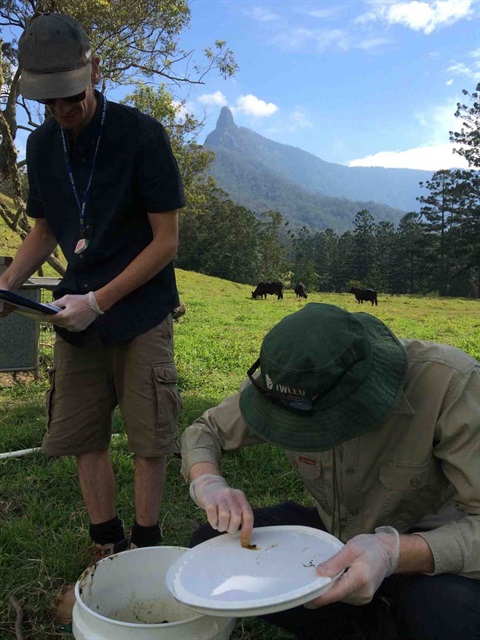Low Down on Dung Beetle Workshop
01 May 2018

Dung Beetles - the missing link between grazing productivity and sustainability
Tweed Shire Council and Tweed Landcare Inc. have held a free workshop for Tweed graziers to learn about the benefits of dung beetles and how to increase beetle populations on their farms.
Dung beetles play a critical role in any sustainable livestock production system by transporting dung below ground and digesting its contents.
Council’s Program Leader – Sustainable Agriculture, Mr Eli Szandala said this improves soil structure and pasture productivity while significantly reducing nutrient and soil runoff into waterways.
“Improving beetle populations also benefits animal welfare by reducing pest fly populations and reducing costs and exposure to chemical controls,” Mr Szandala said.
The workshop featured a number of experts including Dr Bernard Doube of Dung Beetle Solutions, North Coast Local Land Services district veterinarian Dr Phil Kemsley, and Southern Cross University researchers, Lucas Hopkins and Dr John Grant.
Mr Szandala said the speakers provided a number of valuable tips for local livestock producers to get beetle populations and diversity up.
“The key is avoiding or minimising the use of non-beetle friendly chemicals when treating for buffalo flies and gut worms,” he said.
“Graziers can consult with their vet and work through the North Coast Local Land Services Beef Cattle Health and Husbandry for the NSW North Coast guide to develop a long-term cattle health and management program for their property.
“Monitoring parasitic worm in cattle less than two years of age and liver fluke at all ages is important to ensure cattle are treated according to need rather than the calendar, with faecal egg count test kits available for free from Local Land Services or the Murwillumbah Veterinary Clinic.
“Landholders only need to pay a small fee for the laboratory test which saves money in the long term.
“By selectively treating affected stock for parasitic worms graziers will save money by reducing chemical usage, reducing the development of chemical resistance in parasitic worms and therefore reduce the need for use of non-beetle friendly chemicals.”
Mr Szandala said when treating gut worms and buffalo fly, chemicals with the active ingredient Moxidectin tend to be beetle safe.
“Coordinating buffalo fly treatments with your neighbours can also be an effective approach as flies don’t respect fences, so if your neighbour isn’t treating at the same time or using different chemicals their populations will persist and will be more likely to develop chemical resistance,” he said.
“Dung beetle populations can be monitored to understand how changes to on-farm practices can influence total numbers and diversity and in most cases bringing dung beetles in from other farms won’t be necessary if the above principals are followed.”
To learn more about Council’s Sustainable Agriculture Program or participate in future workshops, field days and on-ground projects contact the Program Leader – Sustainable Agriculture on (02) 6670 2400.
Downloads
Photo 1(JPG, 145KB)
Caption: Southern Cross University student Lucas Hopkins (left) and Council’s Project Officer - Sustainable Agriculture Aiden Sloman (right) survey dung beetles on a beef farm, the first step in making the right pasture and pest management decisions.